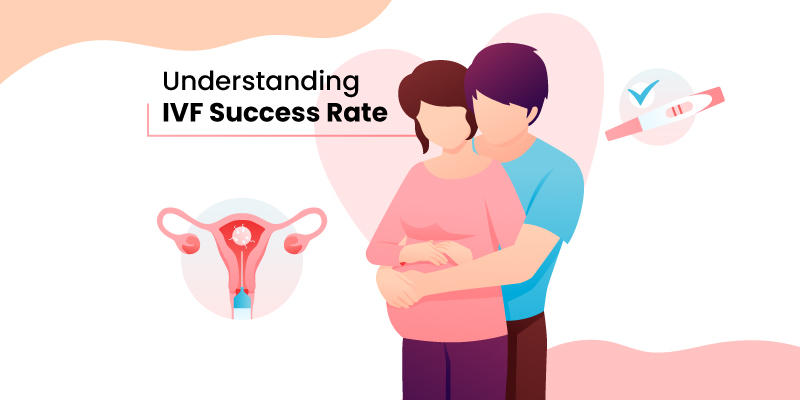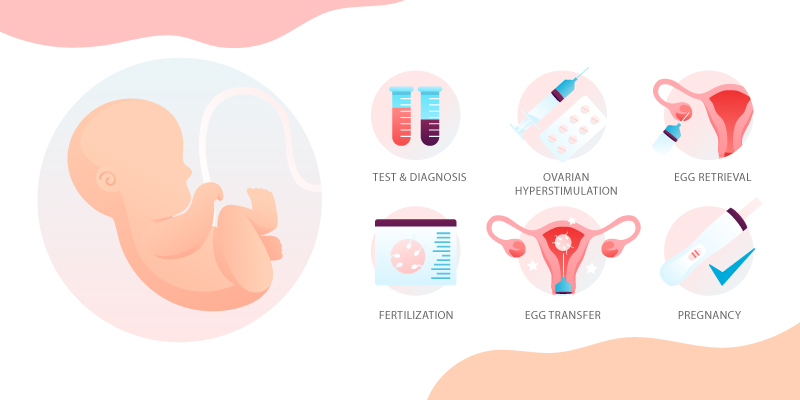Understanding IVF Success Rate

Author: Dr D Maheswari, Consultant & Fertility Specialist, Oasis Fertility.
Many couples go for IVF treatment these days due to delayed parenthood, lifestyle factors, Diabetes, PCOS, and other hormonal issues. However, not all understand IVF success rates and the factors that determine the success rates. Before a couple takes up IVF, it is vital for the couple to not only know about the IVF procedure but also the success rate offered by the fertility clinic. There are a lot of factors that influence the success rates right from the quality of the egg and sperm, the quality of the embryo, the standards of IVF lab, clinician and embryologists’ expertise, the lifestyle of the couple, etc. Let us decode every factor contributing to the IVF success rate.
What is the In Vitro Fertilization process?
IVF/In Vitro Fertilization is an assisted reproductive technique that helps couples to have a child if they are unable to conceive naturally due to various reasons like male infertility, endometriosis, tubal blockage, low egg reserve, and several other fertility issues. In this process, through some hormonal injections, the eggs are taken from the female partner and fused with the sperms of the male partner which results in the formation of an embryo that is later put back into the woman’s uterus for further growth and development.
IVF can be done either as a fresh embryo transfer or a frozen embryo transfer. When the embryo is transferred to the woman’s uterus within 3 or 5 days of embryo formation, it is termed a fresh embryo transfer. When the embryo is frozen and transferred into the woman’s uterus after a month or later, it is said to be a frozen embryo transfer. Frozen embryo transfer has a better success rate than fresh embryo transfer.
Advanced technologies like Single Embryo Transfer wherein just one healthy embryo is selected and transferred enables the successful conception and delivery of just one healthy child through IVF without the risk and fear of multiple pregnancies and the associated complications to both the mother and the child. Several million couples have got the joy of parenthood through IVF.
Factors Affecting IVF Success Rate:
1. Age of the Woman:
The age of the woman is one of the most important factors in predicting IVF success rate as women’s fertility tends to decline after 32 years and a rapid decline is seen after 37. The quality and quantity of oocytes decrease resulting in an increased risk of miscarriage and also congenital anomalies in the child. IVF outcomes are also negatively impacted by an increase in maternal age leading to miscarriages and obstetric risks.
2. Cause of Infertility:
Several studies have suggested that the cause of infertility also plays a major role in determining the success of IVF treatment.
3. Women’s Weight:
Overweight/Obese women tend to have a poor response to stimulation during the IVF treatment process and only a few oocytes (eggs) can be retrieved from them. Obesity can result in reduced fertilization rates and higher miscarriage rates. Weight loss can help in improving the IVF outcome.
4. Quality of Egg, Sperm and Embryo:
For a positive IVF outcome, the quality of the gametes i.e. the egg and sperm, and the quality of the embryo formed by the fusion of egg and sperm is also very important. There are advanced sperm selection methods like Microfluidics that can help in the selection of the best quality sperm for the IVF process. Poor egg quality will impact the success rate and in some cases, donor eggs can be preferred to improve the IVF success rate.
The best embryo for transfer can be selected by the use of advanced technologies like PGT (Pre-implantation Genetic Testing) in the case of women over the age of 35 or couples with genetic disorders thereby reducing the risk of miscarriage.
5. Lifestyle factors:
Smoking, alcohol consumption, and intake of junk foods can have a negative impact on IVF outcomes.
6. Endometrial thickness and IVF success rate:
The thickness of the endometrium/uterine lining plays a significant role in a successful conception. Endometrium less than 7mm may reduce implantation and pregnancy rate.
What is the IVF success rate in India?
The success rate of IVF varies from couple to couple as age, BMI, cause of infertility, lifestyle, etc. varies from person to person. IVF success rate in India at Oasis Fertility is 69% due to the state-of-the-art IVF labs, expert fertility specialists and embryologists.

IVF success rate by age:
Age negatively impacts the outcome of the IVF treatment process. At Oasis Fertility, for women less than 30 years, the IVF success rate is more than 60% whereas for women more than 35 years, the success rate is 50%.
Lifestyle changes that are needed before taking up the IVF treatment process:
· Weight management:
Weight reduction can help in improving the IVF success rate. Get to know your BMI and start focusing on weight loss before taking up IVF.
· Healthy Diet:
A healthy diet can go a long way in achieving a successful conception.
· Exercise:
Regular exercise is very much essential to improve overall health and also aid in a better IVF success rate.
· Managing stress:
Stress may affect the menstrual cycle and also lead to poorer IVF outcomes. Once you have decided to take up IVF, you need to have a calm and stress-free mind. Anxiety, fear, or depression may reduce the chance of pregnancy.
Parenthood is a wonderful journey whether it is through natural means or IVF. Having clarity about the In Vitro Fertilization process is very crucial before you undergo IVF treatment. Not only that but having a positive mindset and realistic expectations will help you to undergo the treatment process without any hassles. As lifestyle factors can be a game-changer when it comes to IVF success rate, it is very important to tweak your lifestyle as well by quitting smoking, reducing alcohol consumption, and including a healthy diet. Happy Parenthood! Leave your worries and go for IVF with confidence, if your doctor recommends it!










